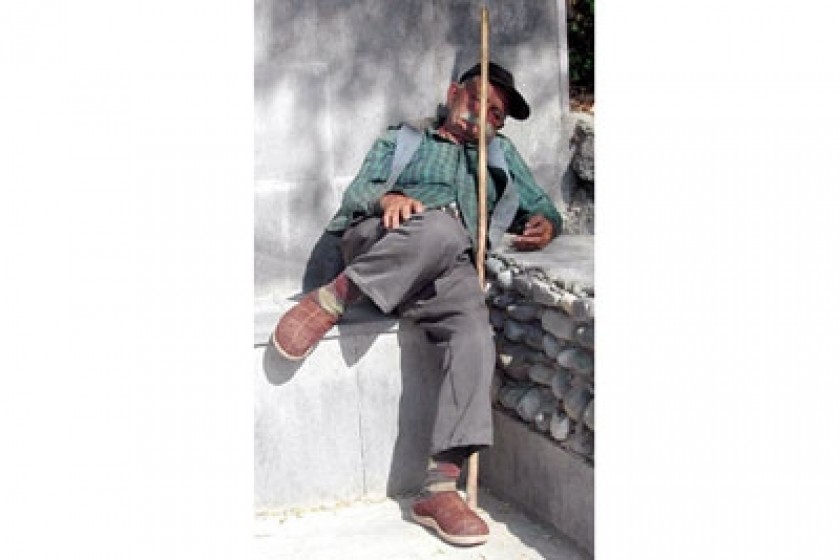
Illusions and Reality: Repopulation Program Jeopardized at State Level
In Berdzor, the regional center of Kashatagh, life has become sort of sleepy. People have grown lazy – it can be felt even in the way they walk and talk. It is not like it used to be, that's for sure. In the villages located some tens of kilometers from Berdzor, they have given in to disappointment. Perhaps a handful of people remain who continue to be optimistic, and believe that the authorities will remember them one day soon. But most are disillusioned, especially by official announcements about returning land.
They did not take those announcements very seriously at first, but it has all started to slowly sink in. While Foreign Minister Vardan Oskanyan's announcements about returning land were largely ignored, Defense Minister Serzh Sargsyan's words about returning five provinces caused concern.
They are living in one of those five provinces.
“The Defense Minister does not have the right to say such things. Anybody else could, but not him. Do you know how much blood has been shed here?” said a lieutenant colonel, posted at the southern border.
Artsakh Bunyatyan, chief doctor at the Berdzor hospital, reacts to any talk of returning land with immediate anger.
“If we start thinking about returning this liberated land, then we are ruined. Whoever thinks of such a thing is doomed, and of course if a lot of people start thinking this then Armenia is done for, Armenians are ruined. Who cares about life or where you live if you have no motherland?”
Government policy has brought about the desertion of the repopulated areas of Kashatagh.
“The policy is such that who the administrative head is doesn't matter. It's not that the government is carrying out a bad plan, but rather that there is no program at all,” said one of the teachers at Berdzor, who preferred to remain anonymous.
“The repopulation of the region was the undertaking of [former head of the local administration] Alexan Hakobyan. At that time, many people did not believe that it was possible – the idea was grand at first, but it was true repopulation. But then things went bad, as they often do,” said a staff member of the former administration.
“The head of the current regional administration has worked as a prosecutor all his life and sees the people as criminals. It's impossible to talk to him,” said the Berdzor teacher, who plans to sell his house and move to Yerevan.
The appointment of the new administrative head, Hamlet Khachatryan, coincided with the period when regional financing passed from Armenia to Karabakh. Earlier, all the money allocated was transferred to the regional administration, which would then decided what to do with it. Now, the Karabakh government allocates the budget and decides how to spend it. After these changes, the budgets of almost all the departments have been cut and transfers have often been delayed. For example, money for food supplies at the Berdzor boarding school has not been transferred for seven months.
Everything is now decided in Stepanakert. One of our sources informed us of the fact that the NKR government has registered two staff members within the Kashatagh administration who never show up for work, but receive salaries regularly.
From the beginning of repopulation in 1994 up to 2004, electricity here was free, but a payment of 14 drams/kW was introduced in 2005, and the price went up to 20 drams/kW on July 1, 2006. This alone would lead one to certain conclusions, but 51 areas in the region remain without electricity to this day.
Introducing payments for medical services starting July 1 of this year was a second blow to the residents of Kashatagh.
“A villager struggling in these difficult conditions has to pay 1,500 drams for a document his child might need for admission to university. If you provide that paper, but don't accept payment for it, then the tax authorities come and ask where the money is and assume that you've pocketed it. They've put us in a horrible situation – one knows the patients well and sympathizes with the situation they are in, but at the same time one must say ‘The state prices have been put up on the wall – an operation costs 54,000 or 60,000 and a daily payment of 8,000 drams is required to stay in the hospital, go and pay,” said Artsakh Bunyatyan, chief doctor of the Berdzor hospital.
Tzaghkaberd is the largest village in the region, with 260 residents. In 1997-98 there were more than 50 children enrolled in the local school. Today there are barely 30. Azat Yeghoyan, the village head, who relocated from Yerevan to Tzaghkaberd in 1994, said that had the government considered the repopulation of this region important, it would have implemented a different policy.
“I see a potential future here, but in order for it to become a reality everyone has to change their attitude towards this region.” continued Yeghoyan, who served as an NKR Member of Parliament from 2000 to 2005. “There should be a law regarding these territories. People should know what fate awaits this region when they're coming here. Our government stated the objective of repopulating this region. But how was this objective laid out, if 6 years ago the population here was 12,000, but it is only 7,000 now?” This is not how it's done. The objective was set in 1994, but no measures were taken to facilitate the development of the region. They brought people here saying ‘Live here, we'll make a house for you in three months,' but nothing was built for 10 years, or they attracted people to villages saying ‘Live here, there will be electricity very soon,' but there was no electricity for ten years. Who is supposed to install electricity, that resettled citizen? Who should these people rely on?”
Kashatagh-Yerevan
 Videos
Videos Photos
Photos




Write a comment